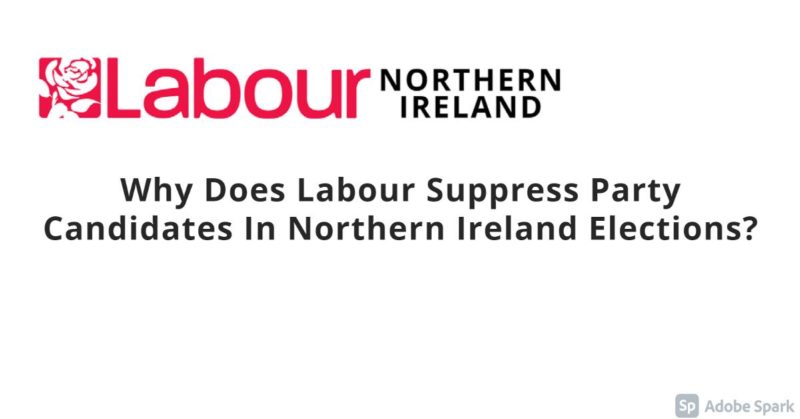Labour Party Northern Ireland The official LPNI website

Tuesday 28 September New Madeira 6.00pm.
Green Room, New Madeira Hotel
Labour Party in Northern Ireland hosts several speakers as we discuss the suppression of LPNI elections.
Chair:
Erskine Holmes – Labour Party in Northern Ireland
Sir George Howarth MP – National Executive Committee, Labour Party
Margaret Gregg – GMB
Emily Thornberry MP – Shadow Secretary of State for International Trade (invited)
Louise Haigh MP – Shadow Secretary of State for Northern Ireland (invited)
Ged Nash TD – Irish Labour Party
Boyd Black – Labour Party in Northern Ireland
The 2016-19 NEC Review report confirmed the continued suppression of Labour candidates in Northern Ireland elections. It attempted to justify this undemocratic practice which denies the people of Northern Ireland their basic political rights.
As a party of government, Labour aspires to govern Northern Ireland as part of the UK. Yet it denies people in Northern Ireland the basic democratic right to vote for Labour Party candidates. We are not allowed to vote for the party that will set our taxes and decide if we have to go to war.
In denying the people of Northern Ireland the opportunity to vote Labour, the party is suppressing the opportunity to build an
anti-sectarian, cross-community, left of centre Labour politics that can challenge the prevailing communal status quo. In practice,
Labour’s stance is compounding and aggravating the sectarian stalemate in Northern Ireland politics.
What we need is a Labour route to reconciliation through electoral politics.
This fringe meeting will provide an opportunity to examine the stated reasons for the party’s damaging boycott of Northern Ireland elections, which we believe to be misconceived and discriminatory.
1. The NEC argues: Labour Party members in Northern Ireland would have to take a view on ‘contentious issues’ making it difficult for the party to be ‘cross-community’. This appears to make a qualitative distinction between the political capabilities of GB party members and those Labour Party members living in Northern Ireland.
2. The report then argues that Labour Party candidates might cause conflict in workplaces and branches where there are affiliated unions and that the local communal parties (such as the DUP and Sinn Fein) could better represent the trade union interest. Yet, three major affiliated unions (GMB, UNITE and USDAW) gave evidence supporting our demand.
3. Moreover, according to the NEC, Labour Party representatives (who would designate as ‘Other’ in the Stormont Assembly) could not be ‘impartial’ with respect to the Peace Process. This again makes qualitative insinuations against the neutrality of Northern Ireland Labour members. It comes from a party that claims the designated ‘Nationalist’ SDLP, now in partnership with Fianna Fail, as a ‘sister party’.
4. The Review argues it is a ‘long-standing convention’ that sister parties do not stand candidates against each other. We can find nothing in the Statutes of the P.E.S., or anywhere else, to support this ‘convention’. It is especially egregious given the SDLP is canvassing for Fianna Fail candidates against Irish Labour in Irish elections.
5. Finally, in the NEC’s view, it would not be ‘responsible’ to run Labour candidates because of Brexit. We don’t see why Northern Ireland is different from anywhere else, given opinion is divided on that issue.
